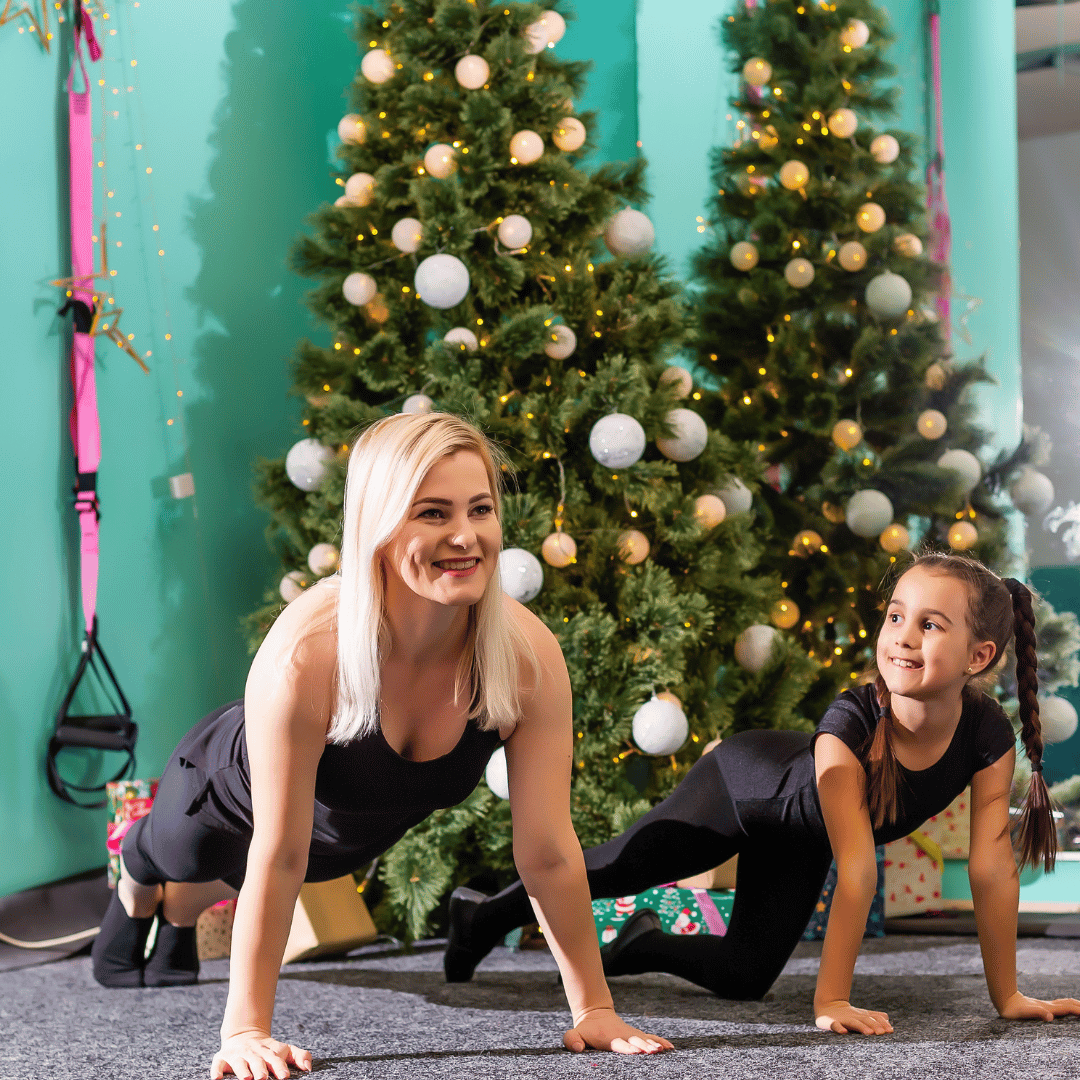
Mix up your exercise routine for a boost to body and mind this festive season
1 December 2023
Georgie Mai-Manning
Clinic Director
If you are somebody who exercises regularly or follows a training programme religiously, the festive season can be both a mental and physical challenge when the routine that you thrive off is thrown into the air.
In the run-up to the holidays, we are so absorbed with getting our festive to-do lists done that it’s common to hit ‘stop’ and then struggle with the sudden change of pace. Whilst it is wonderful to take a rest, see family, eat and laugh, many of us find the holidays very challenging due to the extra time at home, potential inactivity, and heaps of food!
In this article, we are going to share our thoughts on how to prepare for the holidays and give you the information you need about the true physiological changes that occur when you take a breather from training and indulge in the good life.
We aim to get you to think differently when gyms are closed and your routine is out of whack because the truth is that you can really benefit both physically and mentally from the days ahead.
Even the best need to rest! A deload is great for your mind and body
All professional athletes and any clued-up amateur fitness enthusiast will train in a programme that incorporates a short period of rest, known as a deload. The deload is just as important as any other period of a programme, and those in the know really benefit from the mental and physical benefits that it provides. A deload phase in a weight training programme might feature a reduction in weight and/or volume, or in endurance sports, athletes might reduce a combination of speed, intensity, or volume.
If you’re regularly exercising in any form, simply reducing the amount that you do for one week will deliver great results:
- Better recovery for your central nervous system, joints, and soft tissues, including your aching and overused muscles.
- Reduced risk of injury due to the improved state of tissues, the function of joints and the nervous system.
- Improved relaxation and the opportunity to mentally recharge and do something else instead, such as swimming, walking, yoga or Pilates.
Further to this, evidence now suggests that deloading has a direct positive effect when it comes to maximizing your muscle-building potential and performance over the long term in all activities.
Putting it simply, a deload is the secret ingredient to taking your training from good to awesome. It reduces your risk of injury, gives you the opportunity to engage in some different activities, and gets your head back in the game for the next phase of intense training. Embrace it!
A change really is as good as a rest
Building on the deload theme, with gyms on altered hours and an increase in family and friendship commitments over the festive period, you’re unlikely to be able to train as you ordinarily would, but you will benefit hugely by learning something new, developing your movement patterns, or improving your central stability.
How about trying one of these activities instead?
- A Pilates series to improve trunk stability, functional movement patterns, and breathing.
- A Yoga challenge to mobilise, balance, meditate and breathe.
- Daily meditation via an app, YouTube, or whatever works for you.
- A walking or cycling challenge – set yourself a mileage distance and see if you can hit that by inviting friends and family to join you.
- Learn to cartwheel, do a backwards roll, develop a headstand, or learn to skip like a boxer. All just for fun!
Keep your feelings of guilt at bay. The truth about what will ‘actually’ happen to your waistline and muscle mass when you eat more and exercise less
We chatted with Sports Nutritionist Tom Mitchell about the true physiological effects of overindulging for a few days, coupled with some enforced inactivity.
“If you’re somebody who regularly exercises and ordinarily has a fairly stable diet, a few days of over-eating is going to have little to no effect on your weight or muscle/fat ratio. Any weight that goes on will likely be water, and you’ll lose that as soon as you start training again. Obviously, if you consume 10,000 calories every day for a prolonged period, you won’t like the results, but for most of us, there’s really no detrimental effect that will last. So, eat the cheese, and go back for the second (or third!) helping. And don’t feel guilty about it – you train all year for this indulgence!”
Enjoy your time with loved ones – are there stresses ahead that will need managing?
You know what they say – you can pick your friends but not your family! Not everyone in a family gets along, and sometimes there are personality conflicts. Just spending longer than usual with family and friends that you usually get on well with could be triggering.
Plan ahead of time with these pointers:
- Plan to take time out to be by yourself – read a book, go for a walk, or sneakily watch your choice of telly.
- Be realistic about what you can and cannot do; you don’t have to please everyone else, just yourself.
- Stay for fewer nights with family if possible, or plan to stay nearby and give yourself a little breathing space.
And if this isn’t too ‘out there for you – practice tolerance, gratitude and kindness. That’s very easy to say, isn’t it? But really, it’s so easy to flare up at the moment and regret it later, so take a moment to tune into your emotions and choose how to react to things. You can do that by taking time to walk away from a situation that doesn’t serve you, doing some journaling, playing a board game, talking it out, do whatever you need to do to diffuse a negative emotion. It is proven that actively altering your responses in this way can help to reprogramme your primal brain and lead to happier thoughts!
And finally, the physiological benefits of laughter and happiness.
Ok, so you’ve got everything sorted, and you’re all set for a lovely relaxing time over the holidays. There are further benefits attributed to feeling happy and safe and to laughing lots. So, crack out the board games and get silly!
We aren’t quite sure that ‘laughing works your abs’ is entirely proven, but here are the great physiological benefits attributed to having a great time:
- Lowers blood pressure
- Reduces stress hormone levels
- Improves cardiac health
- Boosts T-cells (helps with immunity)
- Triggers the release of endorphins
- Produces a general sense of well-being
How we can help you
Our sport therapy and physiotherapy team can support you whether you are an occasional runner, a dedicated gym lover, or a weekend warrior smashing Tough Mudder, triathlons, or sportives. We spend our time rehabilitating musculoskeletal injuries and problems ranging from hamstring strains and ankle sprains to full post-operative return-to sport. We provide routine sports massage, treatment and rehabilitation sessions, and sports performance screens.
If you know you need us or have questions about how we can support you in 2024 and beyond, please contact us and one of our friendly team will give you a call and chat through how to get started!
We wish you a restful festive season and a strong start to the New Year.

